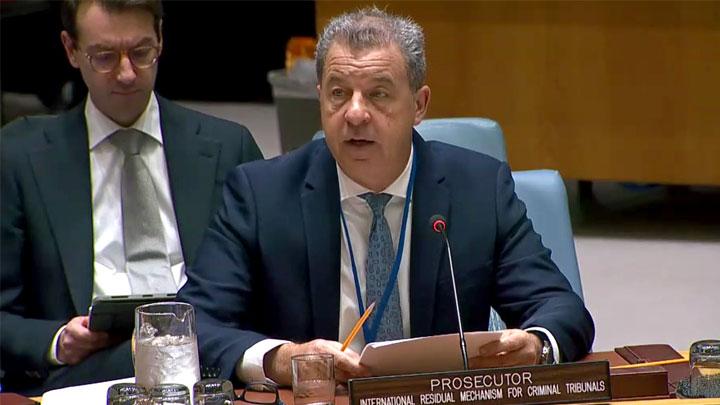Prosecutor Brammertz addresses the UN Security Council

Prosecutor Serge Brammertz of the Office of the Prosecutor (OTP) of the International Residual Mechanism for Criminal Tribunals (Mechanism) today addressed the United Nations Security Council (UNSC).
He began by providing an update regarding the limited number of ongoing proceedings under the Mechanism’s jurisdiction, namely the appeal in Mladić, the retrial in Stanišić and Simatović, pre-trial proceedings in the Turinabo et al. contempt case and the review proceeding in Ngirabatware.
The Prosecutor informed the Security Council that the OTP had convinced the Appeals Chamber to reject the request for review filed by Augustin Ngirabatware, a former Rwandan government minister who was convicted in 2014 for inciting, instigating and aiding and abetting genocide. He explained that the OTP had uncovered and presented extensive evidence of a broad criminal scheme involving many individuals over three years to interfere with witnesses with the aim to overturn Ngirabatware’s conviction. The Prosecutor further informed the Council that the OTP has now indicted six individuals for these crimes, including Ngirabatware himself. Prosecutor Brammertz said, “These results are a clear demonstration to all witnesses who testified before the ICTR, ICTY or Mechanism that they continue to enjoy the Mechanism’s protection.”
The Prosecutor then briefed the Security Council on the status of the search for the remaining eight fugitives indicted by the International Criminal Tribunal for Rwanda, saying “Unfortunately, I must report today that we are not obtaining the cooperation we need from some Member States.” He informed the Security Council that since being notified in August 2018 that a fugitive had been located in its territory, South Africa had not yet arrested the fugitive. While the Prosecutor welcomed news from South Africa last week that it had finally submitted the arrest warrant for execution, he emphasized: “At this late stage, neither the victims nor this Council can be satisfied with anything less than the fugitive’s immediate arrest.” Prosecutor Brammertz further noted that in relation to other fugitives, while the OTP is generating valuable intelligence and leads, many time-sensitive, important requests have not been answered by some Member States, and that the OTP is not being provided with access to the persons and information it needs. The Prosecutor concluded: “The Security Council has repeatedly urged Member States to provide all necessary cooperation in the search for the fugitives. This message, sadly, is not being heard by some States.” He requested the Security Council to send a clear message and underscore to all Member States that the search for the fugitives is still vital today.
Prosecutor Brammertz concluded by updating the Security Council on the progress of national efforts in Rwanda and the former Yugoslavia to achieve more justice for more victims. The Prosecutor noted that much more remains to be done, as Rwandan authorities continue to search for more than 500 fugitives, while in the former Yugoslavia, thousands of cases still need to be processed by national courts. He again informed the Security Council about the continued glorification of war criminals and denial of crimes in Rwanda and the former Yugoslavia. In relation to Rwanda, the Prosecutor noted that there are still concerted efforts to deny the Rwandan geocide by promoting revisionist account and denying the genocidal intent of the perpetrators. Regarding the former Yugoslavia, Prosecutor Brammertz recalled that the denial of crimes and glorification of war criminals is pervasive throughout the region. He pointed out that the depth of the problem could be seen in the actions of politicians, explaining: “They do not seek votes by promising reconciliation or by building bridges to other communities. Instead, politicians believe that they win elections by denying atrocities and glorifying those responsible. Some promote revisionist histories, while others try to gain votes by commemorating, rather than condemning, war criminals.”